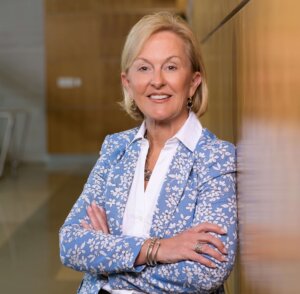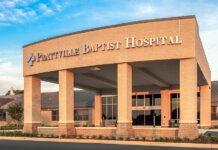
UAB Health System and Ascension St. Vincent’s
On Nov. 1, 2024, the University of Alabama at Birmingham Health System acquired the Ascension St. Vincent’s Health System in a $450 million deal.
Today, all the old St. Vincent’s sites of care and operations have a new name, UAB St. Vincent’s.
UAB Health System, an entity with nearly $8 billion in annual revenues, purchased Ascension St. Vincent’s, including two hospitals in Birmingham (both the main and East campuses), hospitals in Blount, Chilton and St. Clair counties, a freestanding emergency department in Trussville and the One Nineteen Campus that offers specialty care and rehab therapy.

“St. Vincent’s had only recently opened up the free-standing emergency department in Trussville just prior to our acquisition. So, we’ve added emergency room capabilities,” UAB Health System CEO Dawn Bulgarella says.
The deal also includes all of Ascension St. Vincent’s imaging centers and other clinics that were part of the Ascension Medical Group, and all Ascension St. Vincent’s services, facilities, personnel and provider networks in the region.
“It’s been a fantastic opportunity that we’ve had to access physicians, emergency rooms, hospital beds and surgical ORs within the five St. Vincent’s facilities,” Bulgarella says.
Access to additional patient beds is a particularly critical benefit of UAB’s acquisition. For example, Bulgarella says the acquisition has resulted in opening private hospital rooms at Ascension St. Vincent’s that had been previously unoccupied, and, at St. Vincent’s East, two floors that were previously closed due to a lack of staffing.
“We’ve now been together seven months, and we’ve been able to open up additional beds at UAB St Vincent’s Birmingham and at East, and we’ve been able to open up access to additional primary care and some specialty care,” she says.
Bulgarella says that early on, several teams ranging from IT and HR to quality, set out to manage the transition to UAB by focusing on what could be done on day one and making sure that missions were aligned.
“We wanted to ensure that we could bring over most, if not all, of the employees. There were 5,200 employees that we were able to transition over. For them, that meant new payroll, a new benefit structure and new emails,” she says.
“We also wanted to communicate with the patients that their care would continue, that we would have no loss of access and, in fact, as I represented, increased access,” she says.
UAB worked with Ascension to develop one- and two-year transitional agreements, she says — “probably the most significant being the electronic medical records. We’ve been able to maintain some of the Ascension systems while we’re working on transitioning those off to our own systems,” Bulgarella says.
Another point of focus is communicating with providers, she says. For example, most UAB physicians are employed at UAB, but within UAB St. Vincent’s, that’s not the case.
“Most of the physicians there are community providers. So, our communications team has been critical to this process, making sure that we’re communicating with all the employees on a regular and routine basis,” she says.
And while St. Vincent’s was a Catholic hospital, Bulgarella says the shared missions of UAB and St. Vincent’s will continue.
“We worked closely with the Catholic Diocese of Birmingham on the transition,” says Bulgarella, “and while UAB Health System operations remain unaffiliated with the church, all of our associates and caregivers are continuing the great tradition of serving all persons with special attention to the poor and vulnerable.”
“We’re a true statewide network. We’re 15 hospitals and in excess of 200 outpatient locations. We’re the largest employer in the state of Alabama with now 35,000 employees. So, just proud to be a part of it,” Bulgarella says.

USA and Providence Hospital
Providence Hospital in Mobile first opened its doors in 1854.
Today, it is a part of the University of South Alabama, and USA Health Providence Hospital is the 15th largest hospital in the state.
Providence officially joined USA Health in October 2023, when the University of South Alabama Health Care Authority in Mobile finalized an $85 million deal to acquire it from Ascension, a private Catholic health care system based in St. Louis.
Besides the hospital, the deal included all Providence clinics.
USA Health also gained Providence’s 349 hospital beds, eight clinics on the campus and six family practice sites in west and north Mobile and in Moss Point, Mississippi.
Moreover, USA also inherited an estimated 1,800 Providence physicians, associates and other health care providers.
“For us, both of our hospital facilities, our Children’s & Women’s Hospital and our University Hospital, are fairly landlocked, so we didn’t have a whole lot of room to expand,” says Natalie Fox, USA Health’s interim CEO and chief physician enterprise officer.

“Providence has a larger geographic footprint and has attached physician office buildings to the hospital for us to expand our clinical enterprise,” she says.
Fox says USA Health has already expanded some of its existing services to the Providence campus, including a sports medicine practice and an academic neurosurgery practice.
But one major endeavor has involved transitioning all of the electronic records to USA Health, which took place in January, she says.
“Whenever these acquisitions occur, you have transition services agreement, because it’s a big lift to change all of the software and technologies and things we think about that make a hospital system run every day,” Fox says.
“Obviously, Providence has a history well beyond that building and being in this community and providing care. That was really important to us, being able to maintain that history and that legacy, but also coming together with us as the region’s leading academic health system.”
Orlando Health and Brookwood Baptist
Last fall, Orlando Health, a private, not-for-profit health care organization, purchased a 70% interest in five Brookwood Baptist Health hospitals in the Birmingham metro area from for-profit Tenet Healthcare.
The hospitals acquired in the $910 million deal were Brookwood Baptist Medical Center, Citizens Baptist Medical Center, Princeton Baptist Medical Center, Shelby Baptist Medical Center and Walker Baptist Medical Center.
Orlando Health inherited Baptist Health’s more than 1,700 beds, 70 primary and specialty care clinics, an estimated 1,500 affiliated physicians and more than 7,300 employees.

Orlando Health has a 3,487-bed system that includes 17 hospitals, 10 freestanding emergency rooms and nine Hospital Care at Home programs along with seven partner hospitals and emergency departments in Puerto Rico and 10 specialty institutes fields including aesthetic reconstructive surgery and cancer care.
In an interview on the health care and life sciences podcast “Taking the Pulse,” Amy Allen, president and CEO of Baptist Health, and Thibaut van Marcke, senior vice president of Orlando Health, talked about the acquisition and subsequent transition.
“I think you will pretty quickly see changes to our facilities, improvements to our facilities,” Allen said in the podcast interview.
The Baptist brand has undergone a name change to Baptist Health, Allen said.
“We changed our name to Baptist Health and did a lot of marketing around that recently,” she said.
Van Marcke said one goal has been to create a greater coordination of care among the five Baptist Health hospitals in Birmingham.
“Historically, these facilities have been run like five independent hospitals versus a cohesive system. And so, we want to be able to give patients the confidence that you can have access to care in your local hospital. But if you need a higher level of care, we can fill that gap too,” van Marcke said during the podcast interview.
Besides greater cohesion, van Marcke said the team has begun strategic planning to define not just the type of care they will provide, but how they provide it, and what that continuum of care looks like across the five hospitals and outpatient environments.
And while Orlando Health is a secular organization, Allen said Orlando Health has committed to maintaining Baptist’s faith-based culture.
Gail Allyn Short is a Birmingham-based freelance contributor to Business Alabama.
This article appears in the July 2025 issue of Business Alabama.



